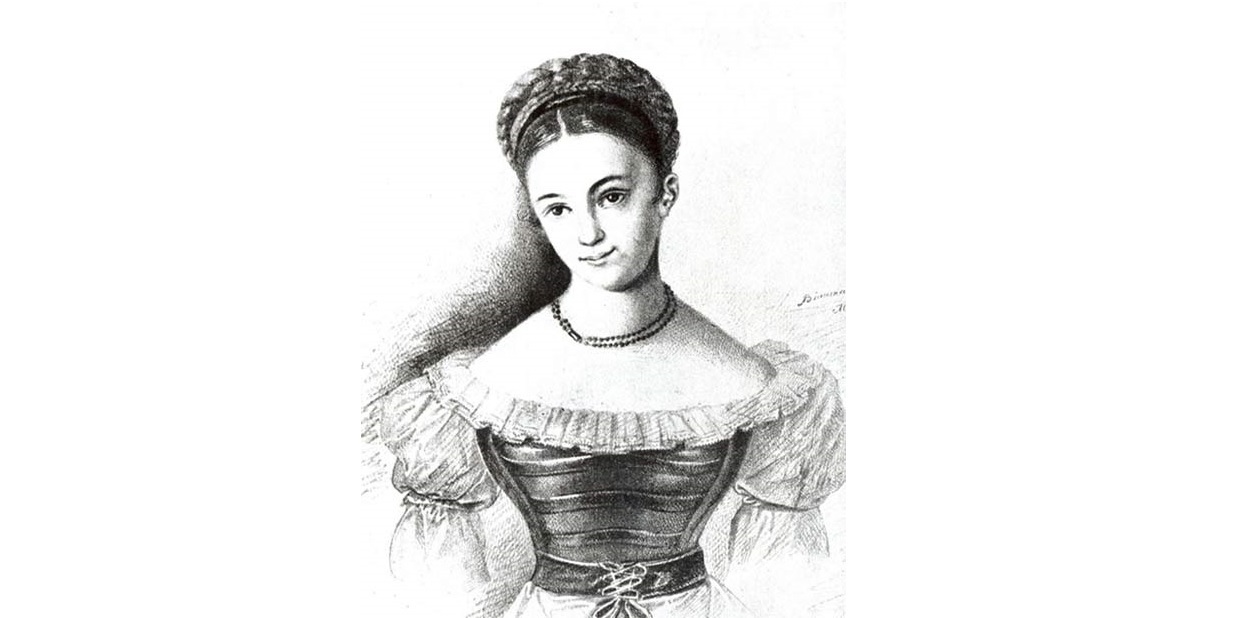
Karolina Karlovna Pavlova, born Karolina Karlovna Jaenisch, was born in 1807 in Yaroslavl, but died in 1893 in Dresden, Germany. Pavlova’s removal from her native Russia was not merely an accident; she had fled the country of her birth four decades prior, having suffered years of ridicule and ostracization as a result of her literary aspirations.
However, in recent years, her work has received renewed attention that has been long overdue.
Pavlova was educated at home by her father, Karl Jaenisch, since she could not be enrolled in a university as a woman. Her homeschooling was more than satisfactory and leaned towards the linguistic; by her 20s she already had at least foundational knowledge of German, French, Spanish, Italian, Polish, Swedish, and Dutch. With the languages she had mastered, she began translating works of poetry and thereby found opportunities to be published. But this was hardly the extent of her aspirations.
In the 1820s Pavlova began attending literary salons, household gatherings wherein illustrious, intellectual circles could meet and hear readings from authors as well as engage in philosophical debate. Though she infiltrated these circles early, opinions on her attendance were divided. From some there was great admiration for her talent and vigor, while from just as many there was stubbornly contempt.
Pavlova was often characterized by her staunch dedication to her writing, never wavering throughout her life despite frequent jeering and dismissal from her contemporaries. Once married to Nikolai Pavlov in 1837, she began to host her own literary salon, and attracted a prominent circle. Within a few years, though, her life began to lose stability, and a powerful male animosity towards her grew.
Pavlov admitted openly to friends that he had married Karolina solely for money. He was a writer himself and was often jealous of her success compared to his own. He struck up an affair with one of Pavlova’s younger cousins, who, to add insult to injury, she had acted as a benefactor towards. He began to gamble her estate away, eventually mortgaging her property without her knowledge. This was Pavlova’s last straw. She took legal action against her husband, unknowingly triggering about a search of his personal library. He was arrested for the possession of banned books and sentenced to a ten-month exile.
Friends and peers turned their backs on Pavlova in the wake of her perceived betrayal. She had lost a social circle that had never quite accepted her to begin with. She left Russia in 1853 and didn’t return. She never ceased to write while abroad, but she died in obscurity.
Given the tragic, male-dominated course of Pavlova’s life, it is unsurprising that her work would center around the oppression of Russia’s women. Yet the continued poignancy and relevance of her work is surprising. Her only published novel, A Double Life, written in 1848, tells the story of Cecily von Lindenborn, a young and well-off society girl reconciling with the path of marriage and domesticity before her. She encounters falsity at every turn: from suitors, her mother, and her young friends hoping to make matches of their own. Half the novel is written in verse, narrating Cecily’s dreams, in which she is visited by a shadowy figure who draws her away from her empty society life and towards the truthful, beautiful realm of poetry.
The novel has all the markings of a classic work of Russian literature: it is sharply satiric, hopelessly tragic, and, paradoxically, sublimely hopeful. For lovers of classic Russian literature, especially female ones, this oft-forgotten work provides a great deal of insight into the struggle of a Russian woman attempting to rise above her station in the 19th century.
Thanks to a 2019 translation by Barbara Heldt, the book has received more attention in recent years. The revivals of both “A Double Life” and of Pavlova herself are overdue and will hopefully find even greater prominence in the public consciousness.





